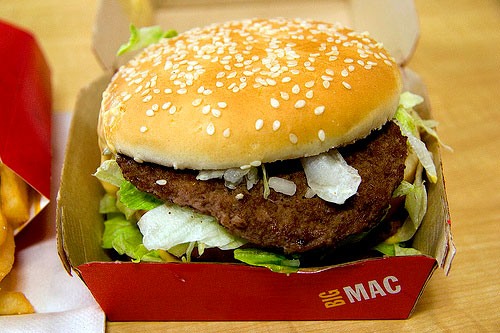
In case you need a reminder about the importance of eating fresh food, here's inspiration: A man from Utah named David Whipple bought a McDonald's burger 14 years ago and claims he still has it. He appeared on the television show The Doctors, as did the hamburger. As an article in the Daily Mail put it, it "looks exactly the same as the day it was first flipped." Whether or not Whipple is telling the truth remains to be seen. However, if the story really is true, it sure does make you think about what may be in McDonald's burgers.
An American nutritionist named Joann Bruso tried the same experiment, keeping a McDonald's Happy Meal for a year. According to the Daily Mail, the burger and fries showed "few signs of going off apart from the beef patty shriveling and the stale burger bun cracking." Brusso claims to have left the Happy Meal uncovered on a shelf in her house. Brusso did admit that there was little moisture in the air since her home is in Colorado near the Rocky Mountains. Moisture speeds up the decomposition process.Read more about the dangers of fast food
However, Brusso also claims that she "had the windows open many times, but flies and other insects just ignored the Happy Meal." Brusso added, "If flies ignore a Happy Meal and microbes don't decompose it, then your child's body can't properly metabolize it either."
A blog post by Stay Free Magazine chronicles a similar experiment with a McDonald's burger and a burger and fries from a local diner. The writer of the post put the burgers and fries in a plastic bin outside the hallway of her apartment for a week. She took daily photos of them. The photos show that after a week, the McDonald's burger has a bit of mold on it, while the diner burger is covered in mold. The fries had similar results.
Business Insider interviewed Dr. Keith Warriner, the program director at the University of Guelph’s Department of Food Science and Quality Assurance. This is what Warriner said about the McDonald's burger experiments:
"With moisture loss, we take away an element required by microbes to grow and cause spoilage. So to spoil a McDonald’s hamburger, we simply need to prevent the moisture loss. This can be done through wrapping it in cling film to prevent moisture from escaping, or storing it within a high humidity environment, such as a bathroom (notice black mold on your bathroom windows but not in your bedroom). If you try doing the same experiment with a homemade burger with similar moisture content as a McDonald’s hamburger and under similar conditions, you’ll probably get the same results."Read more about preservatives
Warriner brings up a good point about moisture loss, but maybe the experiments really do indicate that McDonald's burgers do not decay at the same rate as other food. Although McDonald's does not list preservatives among the ingredients in its burgers, they are most likely present.
Photo Credit: pointnshoot




